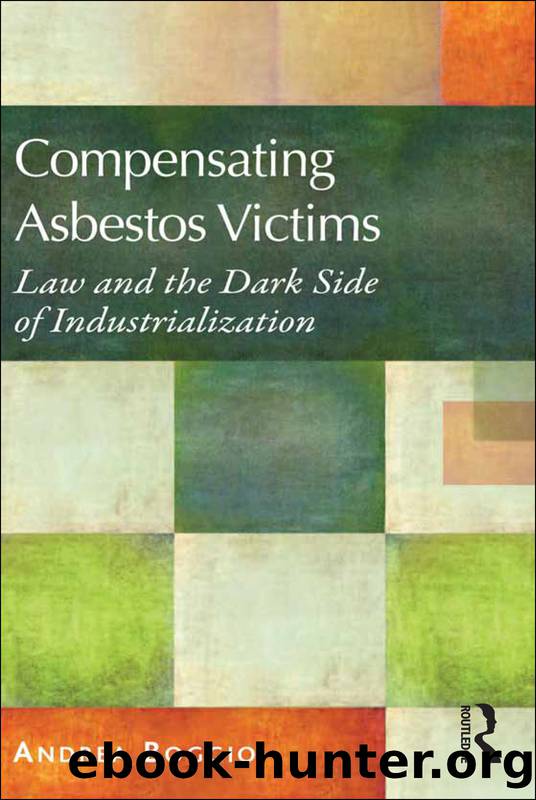Compensating Asbestos Victims by Boggio Andrea;

Author:Boggio, Andrea;
Language: eng
Format: epub
Publisher: Taylor & Francis Group
Published: 2013-08-15T00:00:00+00:00
The practice of joining tort claims to criminal trials
As a consequence of civil courtsâ tough treatment of asbestos personal injury claims, asbestos victims often turn to criminal courts, where they have better chances of recovering damages in tort. Asbestos victims can seek damages by filing a civil lawsuit or by joining an ongoing criminal trial. By activating both, with a preference for joining a criminal trial, victims have slowed down maturity because the two procedural avenues have created two sets of legal expertise, resources, law firm specialization, and court opinions that do not always match and pull in the same direction. While not unique to Italy, the coexistence of these two procedural paths surface only in Italian asbestos litigation. Although complex, it is interesting to explore it further.
Claiming damages in criminal trials has a long tradition in Italy and the 1988 reform of the Code of Criminal Procedure, shifting the process from the inquisitorial model to the adversarial model, certainly enhanced the role of civil claimants in the criminal trial. In criminal trials, the civil claimant is represented at trial by a counsel and are entitled to offer evidenceâwitnesses, expert witnesses, documentsâin support of and relevant to the claims for damages. Civil liability arises only if a guilty verdict is returned. Success is subordinate to criminal conviction. Because of that, prosecutors play a leading role at trial. Civil claimantsâ counsel often limit their advocacy role to the civil aspects of the case.
Civil claims can be grounded on various theories (negligence, intentional tort, or on the breach of the employment contract).81 Breach of contract cases can only be heard by civil courts. Negligent and intentional torts can be heard by both civil and criminal courts. Furthermore, there is a special kind of damages that can be claimed exclusively if a defendant is tried in criminal trial and found guilty. These are moral damages, which can be claimed by joining the criminal trial or filing a civil claim in the aftermath of the conviction.82 Awards for moral damages are usually not large but they are important because victims of occupational exposure can claim them as they are not absorbed by workersâ compensation payments.
Asbestos victims cannot litigate damages simultaneously in a civil trial and in a criminal one. They must choose one of the two paths. A victim who has not yet filed a civil claim can join the criminal proceedings by âjoiningâ the case before or at trial. If a civil proceeding for damages is already pending at the time a criminal trial starts, the claimant can âtransferâ her claim for damages by âjoiningâ the criminal case.83 In this scenario, the pending civil case âstaysâ until the criminal trial ends84 and the criminal court acquires jurisdiction over the defendantâs civil liability in addition to the criminal liability and may award damages to the benefit of the civil claimant.85 Alternatively, the victim may also decide not to join the criminal trial and to file a civil lawsuit independently while a criminal trial is ongoing.
Download
This site does not store any files on its server. We only index and link to content provided by other sites. Please contact the content providers to delete copyright contents if any and email us, we'll remove relevant links or contents immediately.
International Integration of the Brazilian Economy by Elias C. Grivoyannis(111059)
The Radium Girls by Kate Moore(12028)
Turbulence by E. J. Noyes(8050)
Nudge - Improving Decisions about Health, Wealth, and Happiness by Thaler Sunstein(7707)
The Black Swan by Nassim Nicholas Taleb(7129)
Rich Dad Poor Dad by Robert T. Kiyosaki(6633)
Pioneering Portfolio Management by David F. Swensen(6301)
Man-made Catastrophes and Risk Information Concealment by Dmitry Chernov & Didier Sornette(6019)
Zero to One by Peter Thiel(5802)
Secrecy World by Jake Bernstein(4753)
Millionaire: The Philanderer, Gambler, and Duelist Who Invented Modern Finance by Janet Gleeson(4478)
The Age of Surveillance Capitalism by Shoshana Zuboff(4293)
Skin in the Game by Nassim Nicholas Taleb(4250)
The Money Culture by Michael Lewis(4207)
Bullshit Jobs by David Graeber(4191)
Skin in the Game: Hidden Asymmetries in Daily Life by Nassim Nicholas Taleb(4007)
The Dhandho Investor by Mohnish Pabrai(3765)
The Wisdom of Finance by Mihir Desai(3748)
Blockchain Basics by Daniel Drescher(3583)
